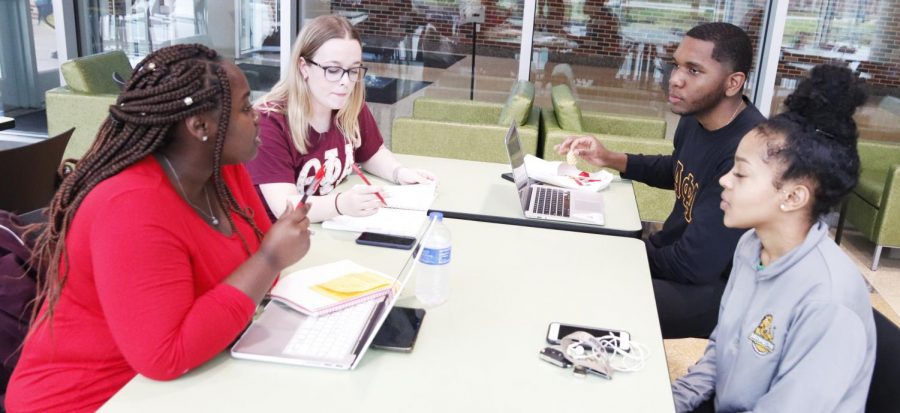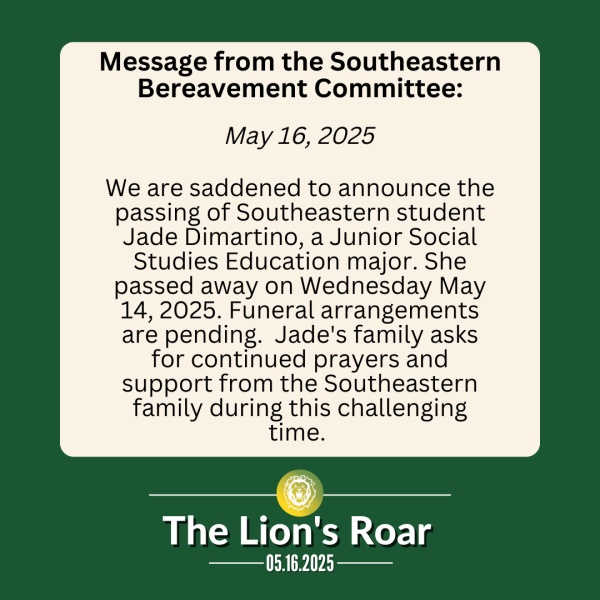Predicting the future of higher education
Jacob Summerville/The Lion’s Roar
Students often meet in the War Memorial Student Union to study and do homework together. Some research predicts that in 10 years, physical universities will no longer be a part of society. However, others believe a stricter stance will be taken on technology in the classroom.
Opinions of how higher education will change by the year 2030 range from few alterations at all to the utter extinction of universities.
In a Times Higher Education article titled “Future perfect: What will universities look like in 2030?” Warren Bebbington, former vice chancellor of the University of Adelaide, predicted that the digital revolution will taper out and eventually lead to limitations on technology.
“Universities will ban laptops and smartphones from their classes to regain the lecture or seminar room as a place where multitasking is suspended in favor of sustained attention to a single topic,” said Bebbington.
In the same article, Eric Cooke, a retired senior tutor from the University of Southampton, said the education system in its current adaptation will vanish when half of all U.S. jobs are lost to artificial intelligence by 2030.
“In 15 years, we will have no students to teach,” explained Cooke. “Students want a good, professional job and degrees are evaluated against employability. But the professional jobs for which we currently prepare students will be done by intelligent machines. So, why would students take on the debts involved in undertaking a degree course as it is conceived today?”
Chloe Powell, a sophomore marketing major, shared her opinion about how the college classroom might look in 2030.
“I think in the future, 10 to 15 years down the road, that we’ll probably be phasing out teachers and looking towards more technology-based school,” shared Powell.
Allison Alario, a junior kinesiology major, believes traditional classrooms will likely be replaced by remote learning environments.
“I think teachers will just video record their lectures and can do them live, and the students will have to go on at a certain time,” said Alario.
Bringing the internet into higher education has given universities the ability to reach beyond the physical classroom. Some universities now offer classes, taught by notable educators, through the internet.
One example is Harvard University’s HarvardX, which currently offers 130 courses. According to its website, students can audit courses for free or pay a small fee to receive a certificate.
However, behind every online class is a teacher making sure students properly progress.
Dr. Colleen Klein-Ezell, department head of teaching and learning, believes teachers will always be needed.
“You still have to have that human factor, that socio-emotional piece that a human brings that AI cannot bring,” stated Klein-Ezell.
As the connection between students and the online world increases, students may lose connection with the real world.
“They’re doing virtual field trips and all of this is just images coming through their mind,” explained Klein-Ezell. “They’re not experiencing it firsthand, and I see where that can make a big difference in a lot of their logical thinking and problem solving.”
Critical thinking is important when navigating everyday events like job interviews and medical emergencies, and a heavy reliance on technology can leave a person vulnerable.
“What happens one day when you can’t have access to technology for a minute or two?” said Klein-Ezell. “What does that do to their logical thinking? Are they relying too heavily on that readily available information?”
According to Klein-Ezell, past generations may have missed opportunities for a lack of technology, but a dependence on technology should be avoided.
“Technology has its place, but there needs to be a good balance between technology and human thinking,” said Klein-Ezell.
Time will tell as to what lengths the educational system will assimilate current and future technologies by 2030.
Your donation will support The Lion's Roar student journalists at Southeastern Louisiana University.
In addition, your contribution will allow us to cover our annual website hosting costs.
No gift is too small.






